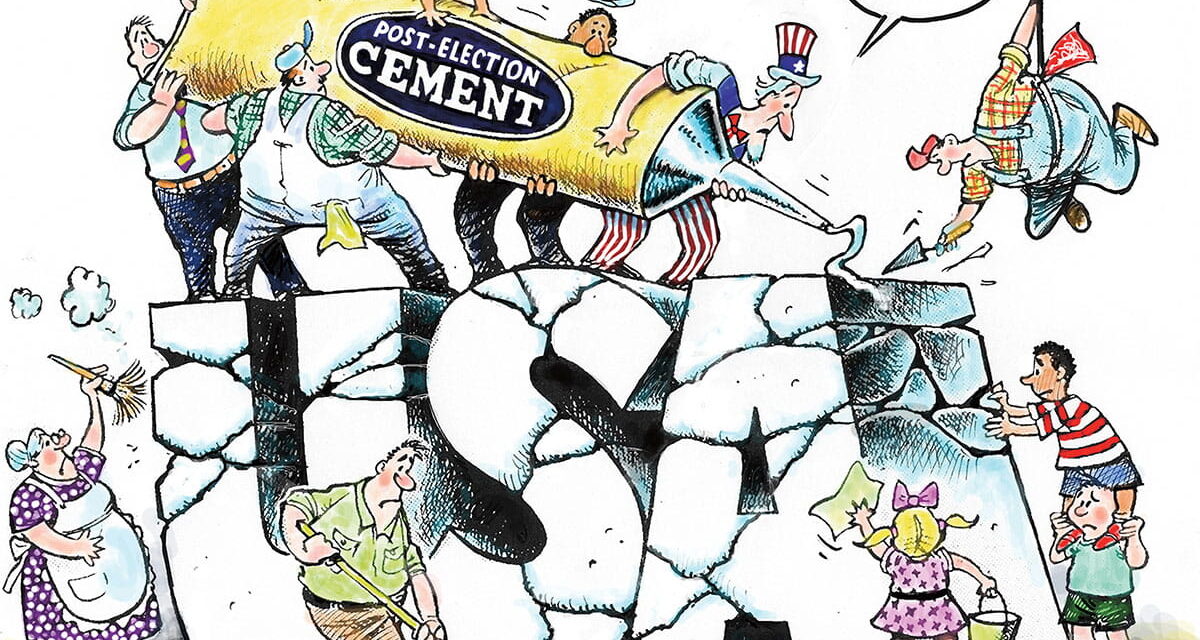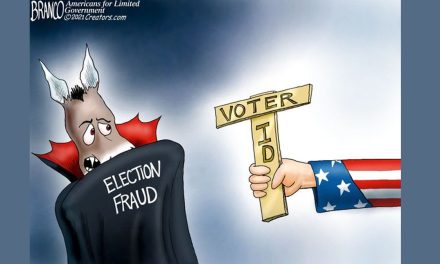
Will America Ever be Great Again?

President Trump has promised to “make American great again.” It has been a catchy campaign slogan, but not a restoration of greatness by a long shot. Maybe we are beyond making America great again..
American greatness was not only dependent on military strength or technological superiority – although those were important to the United States’ role as a world leader. After surrendering in a serious of conflicts, America’s military superiority appears more a theory than a reality. I n terms of technological superiority, we ae losing that advantage to nations such as China and India. In terms of essential computer chips, we are now completely dependent on Taiwan.
The loss of American leadership and greatness may be more the results of losing the real qualities of greatness – hard work, sacrifice, compassion, a clear sense of right and wrong, rugged individualism and patriotism. Those were the unifying traits that created the most enduring experiment in democracy and the most successful national culture in the history of the world. Virtually all those traits have been reversed in contemporary America.
Hardwork
Hard work has been replaced with a sense of entitlement. Success is measured by getting more with less effort – shorter workdays and work weeks, longer vacations, early retirement and reliance on welfare. A successful economy is dependent on the maximum of individuals who are both consumers and PRODUCERS.
In 2000 employed Americans represented more than 64 percent of the population – an all time high. Twice as many producers/consumers as consumers only. Two-thirds of the population were supporting one-third. Today, the number of employed is approximately 160 million, approximately 50 percent of the population. Half of America is now supporting the other half.
A just and charitable society subsidizes the needs of children, the elderly, the infirmed and the disabled. But the subsidies go far beyond legitimate needs. They are doled out in the form of “benefits” and “entitlement” – terms that suggest the money is unearned.
Sacrifice
The sense of sacrifice has been replaced by greed. The percentage of money donated to religious organizations and charities has declined over the years. Abortion has replaced adoption as the means of addressing unwanted children. Statistically, the so-called “greatest generation” has consumed more natural and financial resources than any generation in the history of the world – more than they could pay for. That bill is passed on to future generations in the form of the National Debt. We have literally reversed the notion of sacrificing for our children to have a better life. And for the first time, the next generation will have a greater economic burden and a lower lifestyle than their parents and grandparents.
Compassion
America’s compassion was not a matter of domestic policy. It extended to people across the globe. America was the greatest provider of humanitarian aid in the face of natural disasters and war. America created the Marshall Plan to rebuild the defeated nations in World War II, restoring them to independent democracies. We did not consume or occupy them as part of an empire – as was the case with Russia and Eastern Europe. Most elderly parents spent their last years living with family – not in senior nursing homes. We were good neighbors.
Sense of right and wrong
Perhaps one of the most damaging aspects of political correctness, identity politics and wokeness is that it has blurred the distinctions between right and wrong – and in some cases switched the polarity altogether. What kind of culture demonizes police and caters to criminality? It is wrong to make the criminal the victim – or to tolerate crime. Failure to enforce the law breeds more crime. That is wrong. It is wrong to allow a male who self-proclaims to be a woman participate in women’s sports. It is wrong to expose young children to adult sexual content … period. It is wrong to enable young children to engage in gender selection or pronoun selection. It is wrong to maintain millions of blacks trapped in segregated and impoverished ghettoes. It is wrong to judge the murder of a white male a lesser crime than the murder of a white woman … or a black man … or a gay person. Yes, much of this has become normalized in today’s American society, but that does not make it right or beneficial to a healthy culture.
Rugged individualism
“Rugged individualism” is an unfortunately anachronistic term to reflect a level of self-reliance. Situations and issues are first to be handled by the person. Only when that is not possible does one seek the interjection of others – with government being the option of last resort. That is especially true of the federal government. Today, the federal government is less Uncle Sam and more like Big Brother. The citizens have evolved to seeking federal assistance as the first and permanent option. Arguably, it is loss of self-reliance that has surrendered hard work, sacrifice and compassion to Washington as a government service.
Patriotism
Patriotism is the recognition of the common culture. America was founded on the principle – if not the total reality — of e pluribus unum – out of many, one. The genius and goodness of America was the ability for self-improvement – to make “a more perfect union.” America attracted and embraced cultures from throughout the world, and through assimilation bonded them into one culture – the American culture. Despite political differences, there had been a strong sense of common culture – patriotism. It was reflected in respect for the flag … the National Anthem … and the Pledge of Allegiance.
The failure to respect and embrace the symbols of unity has resulted in the tribalization of America. We have devolved into a collection of competing – and even warring – demographic tribes.
We no longer pass our culture on to the next generation. Rather we openly disrespect the flag .. the National Anthem … and the Pledge of Allegiance. They are no longer part of our early education. On the Fourth of July, one or two flags were seen on the more than dozens of homes in my own neighborhood. Sports owners have stopped playing the National Anthem or requiring players to be present and standing. Schoolchildren no longer start the day with the Pledge of Allegiance.
Patriotism is the mutual expression of the common culture. Without patriotism, we would have no recognized common culture. Or perhaps, without no common culture, we have no patriotism.
Summary
The loss of the unique American culture is coincidental with the loss of American leadership in the world. To increasing number of nations, the United States is no longer that bright shiny house on the hill. We are no longer the reliable friend and ally – or even the formidable and feared adversary. It is not that the world has lost respect for the American culture, but that America has lost its traditional culture that the world once respected. Respect cannot be demanded but must be earned. What was once respected no longer exists. America has stopped being America – and we have lost respect at home and abroad. Looking at America’s political leadership across the board, I do not see the person or people who can really make America great again. For the sake of future generations, I hope I am wrong.
So, there ‘tis.





























Thank you, Mr. Horist. I had this one in the can forever, and like you, it’s time to roll it out, would love to see your take. It’s not a rant, it’s not a screed —- call it a ramble. While I might not agree with your whole ramble, I do understand the yen to go back to days of yore, the good ole days. I applaud you for not using the word Democrat once! Miracle of the ages. I hope it did not hurt :>)
As we age, often we lament about the days of old, when men were bold, and legends told..blah de blah. I am sorry, but I believe America is great and our best days are in front of us. I look to a new generation of woke individuals trying to expand equality. Sure, we had a pandemic, destroyed our stability and turned things upside down, still. Crime up, suicide up, divorce up, kids down, we can put science to work to figure causes or lament how it’s the younger, lazier, self-absorbed generation like my Dad called me :>)
But I can’t argue with Larry on his opinions here, plus since everything is bad, don’t want to. Here’s my version of what can be done to make up have an Industrial Age in the Information Age. It’s economics, stupid, that makes America great. My version deals with the economy and I have had this since the 90’s. Nothing has changed.
For decades, I have thought that the US has been failing on its economic future and could be doing much better. Economic factors have wide ranging affects from crime to suicide to divorce. While our debt and deficit hang like the sword of Damocles, IMO, our major long-term issue is that we remain locked in the Henry Ford model of a factory economy with a factory-less economy.
We also have a vibrant service economy and that will continue to expand in two forms. Professional services, like electricians, plumbers, etc. will always be needed and should be well compensated for these Professional Services. And the other service workers from cashiers to janitors that need to be fairly compensated with livable wages, not government subsidies. Driving the need for services will be folks who create new things from new ideas, our inventive class that needs to evolve to match what Henry Ford did in the Industrial Area. Here we have information workers, inventors, and the prototyping shops that support them.
IOW — we all know how the industrial era became a global NWO pioneered by the US and guys like Ford. It changed our life by creating the middle class. We still have that at the core of our economic model except our cost structure pretty much concludes that it can be made for less cost over there. That’s why our chips are made in Taiwan, although perhaps we cut that cord a bit early and a bit exclusive to one other country. And where over there is can change as host country economies change. Japan used to be our factory, then South Korea, and today – China. Other’s will push back on China every day. Low-cost wins, especially for non-specialized production which every manufacturer strives for. If humans are needed, we can never be low cost in that model.
So, if we cannot win on the factory floor, if just building a bigger boat won’t fix it, how do we win in the future? IMO — creativity, invention, and creation. The problem is the vast majority of our economy and even culture is based on the Ford Model of mass production after someone, in some weird way, comes up with a new idea. Our schools are based on it too. We need to change that to an education and work environment that cranks out new inventions like we churn Mustangs off the factory floor. We need to learn to create, invention as a goal. Our factories need to be streamlined for developing invention prototypes out to steady state factory production where our “creation system” easily adapts inventions to send that stable product line overseas and then start the invention factory process again. The new American economy circle of life: dream, invent, prototype to steady state manufacturing and then hasta-la-vista to cheap labor country while we start the process again and invent the next BBD (bigger, better deal).
Gillette at one time was a the maven of marketing, they owned a commodity market, like soap, by using technology to invent new things in a commodity market where there was no invention, just cost cutting. They charged a premium for that too, and got it. One really cool thing they did was in their process, a product as not rolled out until another one was deep into testing mode. IOW, they already had the next new invention in the can before the previous BBD (bigger better deal) was rolled out. We need that type of think as the bedrock of our information age economy.
Our schools are still based on the three r’s and rote, factory-like learning. We need an education system that fosters creativity from dreams to invention to production. That’s a tall order and a sea change. Factories too need to adapt to be able to prototype, produce, and then give it up and do it again, over and over. That’s a lesser order sea change but still will require an entirely different skill set than in our factories today. A smarter set of skills.
Just saying that I see this as our way to retain global leadership in a world with more and more, cheaper production capabilities than ours, every day. And we are not alone: Japan needs this, Europe too. China — someday soon but not quite yet.
Just saying, and yeah, I know the concept is weird, but consider the source. And we have some good signs coming from all places, the internet. Many younger entrepreneur’s are using the internet model to take on older, established, brick and mortar industries. Inventing new things like deodorant for everywhere, new societal concepts like free socks for the poor when you buy socks or reduced ocean plastic when you buy a wallet. We are inventive still yet need to amp it up by making invention like we used to make cars rolling off the Detroit lines.
I know it’s a crazy idea, but the economy has much to do with our culture, social issues, and such. We can not win the low-cost factory wars unless it’s about automation and us leading there. Our days of having a HS degree, working in the factory for middle class wages, putting kids in college to live a better life, are over. We need to be masters of creation, masters of invention, and our entire system must be geared to support and entice that. We have to realize that we are moving to a invention and service economy and start treating all service workers as valued, fully contributing individuals that can support a family through a life of service.
On the other side, as I noted, I think the next generation is great. In my family, my father was the first-college generation, I am the “all go to college for advanced degrees” generation, and the next generation in our family includes doctorates, jd’s, and more with better careers than my slugging it out in the corporation as a hired gun. They are great and I can’t wait to see what the grandkids come up with. I am ever hopeful, but IMO, while I lament as above, what Horist and I and others from our generation can do is MANDATE that we continue and turn up the heat on ending deficits and paying off the debt. From budgets to borrowing, that’s the focus of where we need to make our stand with what little Moxy we have left in us.
Rambling over, thanks Mr. Horist, I enjoyed reading yours and hope you can return to Mayberry any day now. Actually, we have it. It’s called Belvidere and it has wide streets, big ole Victorians, and kids are riding bikes down the street. A big town square is where I go sometimes to sit and pretend that I’m gonna party like it’s 1965. Then a cop comes by and says, toss the joint buddy, this is our town…..
Frank Stetson, I like to believe that I am a fairly intelligent and educated person. I have no idea what you are saying beyond we have to stop borrowing and invent more things and let the third world countries be our labor force. Beyond that all I got was a lot of words saying nothing. We made China our workforce and they used our money to build the biggest army and navy in the world and they are very aggressive. We make about 80% of our drugs in China leaving us at their mercy. We make all of our chips in Taiwan which can soon be taken over by China. I can’t make out if you are a woke liberal or a Conservative. Low cost production is not always the be all and end all if it puts us at the mercy of our adversaries or as in the case of China, our enemy.
What you call the Ford model of mass prodution is thebasis of the American economy. You can look at almost any small or medium town in America that is not within commuting distance to a big city and you will see this Ford model present itself. Take a small town like Gainesville, Florida. Besides the independent business people and professionals, the rest of the town is mostly supported by the medical center and the University of Florida. This is true of mostly every town in America which is supported by a factory, a school or a medical center. This is the Ford model and it has worked to make America great. This greatness is only being challenged today by all the things that Mr. Horist brought up. Studying is bad, cheating is good. Police are bad, criminals are good. Borders are bad, illegal aliens are good. Honesty is bad and stealing is good and so forth and so on. I will close by saying I have no idea what your point is but from what I can make out, it is wrong.
MP: good points. Let me attempt to clarify. And sorry about the words. If I type less, I get even more calls for clarity.
The Henry Ford model is over; those factories will be in countries with lower labor rates that we can never match. Sorry. Our factories will either be for prototype products, or highly automated with scant, and really smart, expensive, labor. We will still have some — like really heavy things you don’t want to ship or foreign things that do it mostly for marketing reasons. Thus, cars. But if factory is your aspiration, I tell all the kids —– go solar. Somehow. Design, development, deployment —- it’s clean, relatively safe, is good for the planet, and most important for youngsters —– it can be a 50 year career right now for economic security. Government subsidies don’t hurt either. But to your questions:
Look at different economic ages:
Agrarian Economy —- pioneers until industrial age for the US
Industrial Economy —- Henry Ford factories, like 1870’s ( he was actually around 1900)
Information Age —- Late 1900’s (it’s me, I did it with Al Gore :>)
What I see is the next age, the next superpower, will be the Invention Age (or something better)
The difference is we no longer produce, we create. It’s not about making things, it’s about inventing things. It will force big changes, but those societies that embrace and foster the change will lead the world like we lead the industrial age and the information age. To do that I feel we must change much, probably everything, even our education infrastructure. We’re kind of based in the three r’, memorization, and then spit it out like cars coming down the line. Worked for agrarians, industrial types, even info workers. But there’s zero creativity, imagination, or invention in rote learning. We need to structure education to make imagination and invention the goal —- not repeating the periodic table. That does not say we don’t need to know and remember stuff, it just means the entire structure needs to promote invention, not studying to be able to watch cars go down a line.
An example: Honda has plants all over the world for all sorts of reasons. I bought my hybrid from a Japan factory. Why? Because the first ones are perfected there, and then the world. Man it was well built, perfect seams and paint. I actually bought a second one in the US: mileage was not as good but might have been my MIL — ole lead foot. Not an example of invention, but of the prototype factory process Honda already uses.
Another funny Japanese tale, in the 80’s, when they were crushing us with better quality and better ideas, double whammy, I visited a partner to see their JIT production. Basically we partnered with them to pay to learn their ideas. It was amazing, as was headquarters open office. We learned a lot. But this stuff goes hand in hand with cultural changes too. At this time the Tokyo TV was squawking about people eating Doritos, that evil food from the West. I laughed as I thought: it’s all over, the Doritos got them. Soon, they will want 40-hour weeks and two weeks paid vacation. I expect we will see that same phenomena in China soon, if it all isn’t already happening.
PS: I came back to the States and worked with others to beat the crap out of the Japanese by being able to compete with them based on product quality, design, and invention. Our factory had 5,000 screws, every designer picked a new one. We said, try 200 and made it so (after years). Got plenty of those stories, but the bottom line was that we were going to lose, and a bigger boat wouldn’t help. The factories I know are either laboratories, small specialized plants or gone.
As I said, we will also need to structure our next gen factories to handle prototypes of invention, steady state production techniques, and then farm them out to cheaper labor. Sounds easy, but it’s a big change to be an expert in new product production providing design data back to the labs to improve rapidly, maybe work with the labs to make design changes on the line, and then giving it all up. That sounds simple, but it’s a big change. I had incredible problems over the smallest factory changes including telling them to get screwed. Designers always picked a new screw, we had thousands, and we mandated, like the Japanese, a few hundred. Big savings believe it or not.
Enough stupid stories. Hope that clarifies a bit. You can see how we went from Aquarian to Industrial to Information Economies, an age which we are clearly still in. You can see societal changes that force that and are forced by it (work at home, it’s like going back to the farm :>).
For over a decade, since I was taught this concept from a famous economist, I have been a believer that the next phase in coming and we need to do things to make it so, in a positive way. I made a career out of managing the creation and invention process creating dozens of new ideas and products. Challenging, more so since I was not educated or trained for it, but well worth it given — in products — new is where the big money be. Although not for me, he he :>)